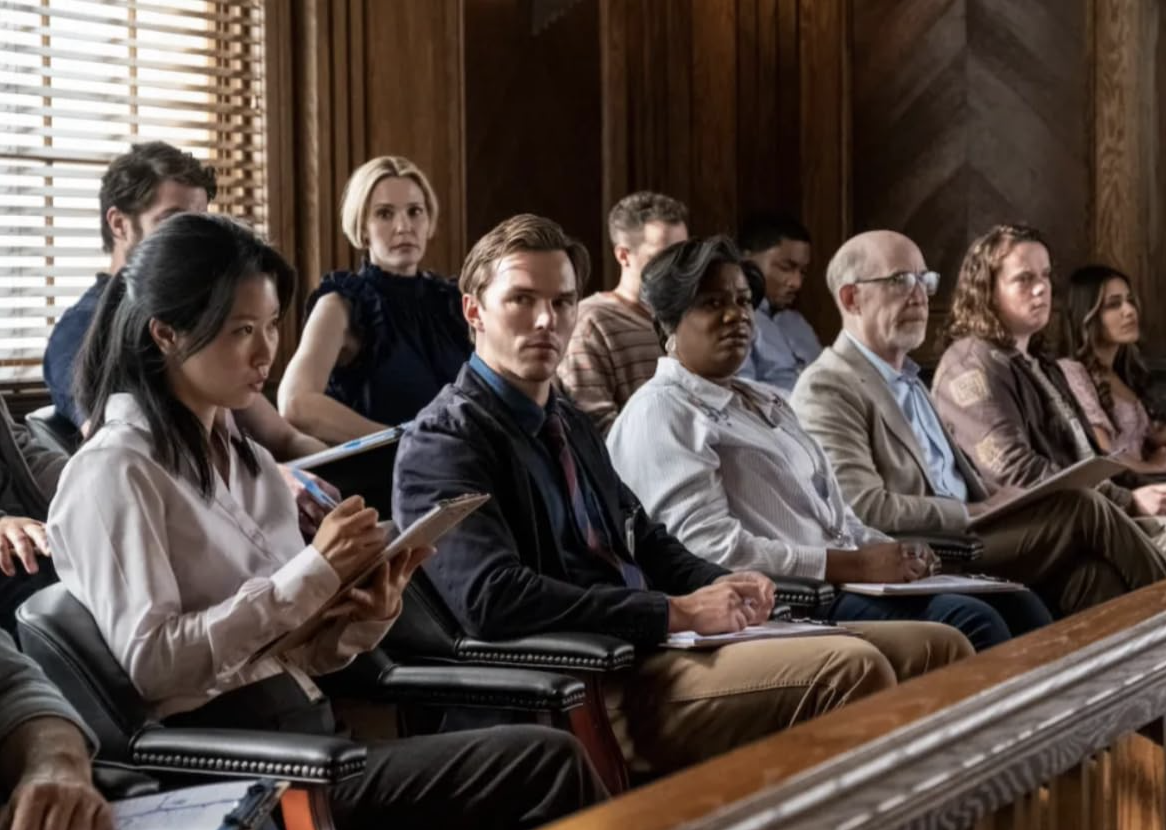
Juror #2
November 10, 2024 / Kevin Ward — ★★★½☆
In Juror #2, Clint Eastwood crafts a courtroom drama that doubles as a morality play, probing the intersections of ethics, justice, and redemption. Nicholas Hoult stars as Justin Kemp, an expectant father who begins jury duty believing he's simply fulfilling his civic responsibility, only to uncover a devastating truth about his potential connection to the case. The trial centers on James Michael Sythe, accused of killing his girlfriend, Kendall Carter, after a public argument. Prosecutor Faith Killebrew (Toni Collette) aggressively pushes for a conviction, driven by her looming DA election. At the same time, Sythe's public defender, Eric Resnick (Chris Messina), fights an uphill battle to mount a defense with limited resources. What begins as a standard legal drama soon escalates into a profound moral dilemma as Kemp realizes he may be responsible for Kendall's accidental death and that Sythe may, in fact, be innocent.
Kemp is embroiled in a conflict of interest with extraordinary stakes. If he reveals his knowledge, he risks placing himself at the center of a homicide investigation, threatening not only his life but also the future of his family. The moral quandary of whether to come clean or protect himself becomes the crux of the film, highlighting the tension between personal responsibility and systemic justice.
In the tradition of morality plays, writer Jonathan Abrams uses names that symbolize character traits. Faith and Justin are the most obvious. Even Sythe evokes the imagery of a "scythe," symbolizing death and judgment. These names underscore the film's thematic underpinnings, turning the courtroom into a stage where justice and morality are constantly tested.
Kemp's character is initially framed as the archetype of virtue: a civic-minded, expecting father who resists the temptation to avoid jury duty and earnestly tries to do what's right or "Just" (capital J). This portrayal encourages the audience to empathize with him as he struggles with his decision. Conversely, Sythe is painted as the antithesis of Kemp—a "bad guy" with gang tattoos, a brash temperament, and a history of substance use. These traits, presented as markers of immorality, invite the audience to judge Sythe harshly. While these elements are meant to show how easily the jury—and, by extension, the audience—can be swayed by superficial biases, Eastwood also invites us to play the jury. By highlighting these characteristics, he nudges the audience to make moral judgments about the characters, pushing us to confront our assumptions about who "deserves" justice.
The film's conceit of stacking the deck so heavily sometimes feels disingenuous. By framing Kemp as virtuous and Sythe as morally suspect, the filmmakers initially position the audience to root for Kemp and accept that justice might be secondary to character, seemingly to make the point that the opposite should be true--that justice must transcend personal biases, no matter how inconvenient or damaging the truth might be.
Kemp's moral journey unfolds alongside a critique of the justice system, which Eastwood depicts as rife with personal agendas. Faith's ambition, Resnick's underfunded defense, and the individual biases of the jurors themselves—including those eager to go home or convinced of Sythe's guilt based solely on his demeanor—all illustrate the systemic flaws that can distort the pursuit of truth. By casting the audience in the role of the jury, Eastwood implicates us in these flaws, urging us to reflect on how quickly we, too, make judgments based on incomplete information.
As Kemp wrestles with whether to reveal his role in Kendall's death, his conflict becomes a meditation on accountability. The stakes feel painfully real as he considers not just his own future but the implications for his pregnant partner and their unborn child. His scenes with his AA sponsor, Larry Lasker (Kiefer Sutherland), are among the film's most poignant, as they reveal Kemp's internal struggle to reconcile his self-image as a "changed man" with the crushing weight of his secret.
The film culminates in a final act that upends its earlier manipulations, delivering a stark reminder that justice matters for everyone, regardless of character or past mistakes. Eastwood uses Kemp's story to emphasize that the justice system's purpose is not to validate virtues or condemn vices but to ensure fairness and impartiality. By the end, Kemp's decision forces the audience to confront their biases and reconsider the true meaning of justice in a system—and a world—shaped by human imperfection.
At 94, Eastwood proves he can still craft layered, provocative dramas that challenge audiences to grapple with difficult questions. Juror #2 may not be an awards season contender, but it's a thoughtful exploration of morality, redemption, and the biases that cloud our judgment. I feel like the film presents a cynical view of how Eastwood expects the audience to react to certain characters, at times pushing too hard to steer us in a specific direction. Still, it's a film that invites introspection, urging viewers to reflect not only on the characters' choices but on their own capacity for fairness in the face of complexity. Eastwood's deliberate pacing and strong performances from Nicholas Hoult, Toni Collette, Chris Messina, and Kiefer Sutherland keep the tension simmering throughout.
Director: Clint Eastwood
Screenplay: Jonathan Abrams
Cast: Nicholas Hoult, Toni Collette, J.K. Simmons, Chris Messina, Zoey Deutch, Cedric Yarbrough, Kiefer Sutherland
Producer: Matt Skiena, Jessica Meier, Tim Moore, Clint Eastwood, Adam Goodman
Runtime: 114 minutes
Rated: PG-13

